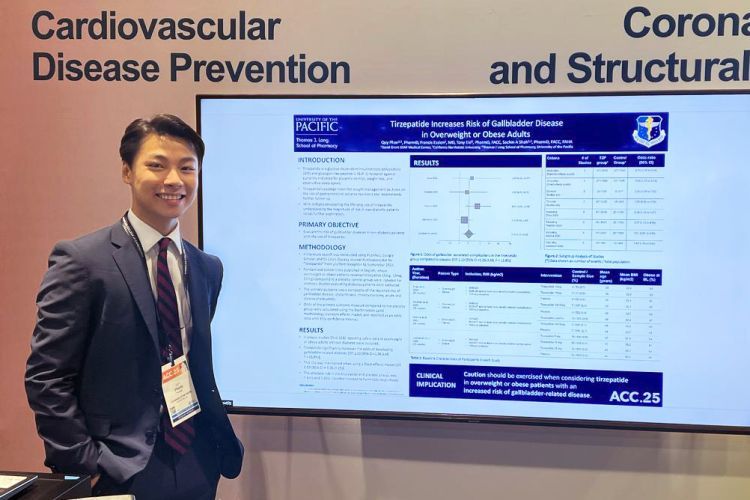Breadcrumb
Pacific research team finds weight-loss drug doubles risk of gallbladder disease
Recent findings highlight important safety considerations for pharmacists counseling patients on weight management medications. Research led by Pacific post-doctoral fellow Quy Phan, PharmD reveals a significant increase in gallbladder disease risk among non-diabetic adults using tirzepatide.
The popular weight loss drug, tirzepatide activates two key hormones in the body to help regulate blood sugar levels and appetite. It has gained significant attention for its effectiveness in helping patients manage their blood sugar, lose weight and improve sleep apnea. However, new discoveries raise important clinical considerations.
Dr. Phan, a medical information fellow at University of the Pacific, along with faculty and colleagues from David Grant United States Air Force Medical Center, found that tirzepatide more than doubled the odds of developing gallbladder-related diseases compared to a placebo. For every 55 patients treated with tirzepatide, one additional case of gallbladder-related disease can be expected.
Sachin A. Shah, PharmD, FACC, FAHA, professor of pharmacy practice and director of Pacific’s Fellowship in Industry Program, contextualized these findings within the broader weight management landscape.
“What concerns me is I know people with a body mass index of less than 30, with no other comorbidities, who are using tirzepatide,” said Dr. Shah. “This finding stresses the importance of considering risk factors and the importance of considering lifestyle interventions first.”
Over 70% of adults in the U.S. are overweight or obese, according to the National Institutes of Health. For those who have spent years, or even decades, trying to manage their weight, the potential benefits of weight-loss medications are compelling. Tirzepatide yields approximately 20% weight loss at its highest dose compared to a 7% weight loss through lifestyle interventions only in a double-blind, placebo-controlled study. According to data published in January in the Journal of the American Medical Association, approximately 1.5 million weight loss prescriptions are written every month in the U.S.
As medication experts and the most accessible health care professional, pharmacists play a crucial role in educating patients about potential complications. Teaching patients how to recognize gallbladder disease symptoms could be lifesaving.

In March, Dr. Phan presented the team’s research in Chicago at the American College of Cardiology 2025 Scientific Session.
“We take immense pride in the exceptional caliber of our Fellowship in Industry Program fellows,” said Allen Shek, PharmD, professor of pharmacy practice and associate dean of professional programs. “It is a remarkable achievement for a first-year fellow to present at a prestigious national platform like the American College of Cardiology, highlighting their meaningful contribution to science.”
Fellows engage with current doctor of pharmacy (PharmD) students through the Innovative Clinical and Outcomes Research Center.
“Our fellows consistently serve as exemplary role models for our industry-bound PharmD students,” added Dr. Shek.





